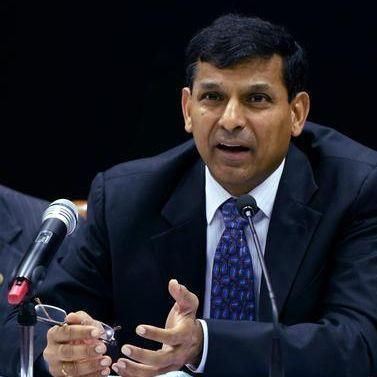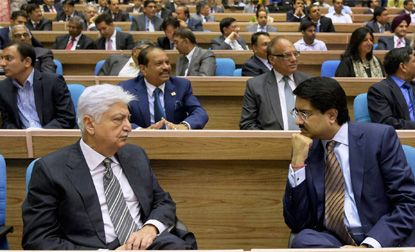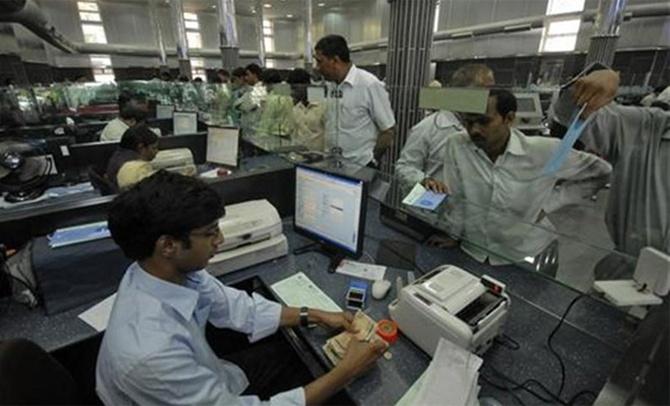Be it escaping the I-T sleuths or securing finance from a bank and not repaying it, Indian businessmen has a way of finding solutions to everything through quick fixes or ‘jugaads’.
In a recent lecture, RBI governor Raghuram Rajan dished out some frank advice -- don’t get into ‘jugaad’, instead try for the long haul. Only that will sustain in the long-run.

Reserve Bank of India governor Raghuram Rajan recently stressed the need for improving business environment in India and how we can assure consistent growth in future.
Delivering the fourth CK Prahalad memorial lecture, Rajan said, 'If we look around the world today, it does not present a pretty picture. Industrial countries are still struggling, with a few exceptions, to grow. BRICS nations are in deep trouble but India appears to be in an island of relative calm.'
Addressing bankers and industrialists, the RBI governor said the authorities must ensure that the Indian economy remains stable unlike Brazil which was hailed as one of the most promising emerging markets but has now been downgraded to junk rating by Standard and Poor’s.
Here's Rajan, in his own words, on how India can avoid such turmoil.

What actually happened in Brazil
Only a few years ago, the world was applauding the country’s thriving democracy, its robust economic growth, and the enormous strides it was making in reducing inequality.
It grew at 7.6 per cent in 2010, and had discovered huge oil reserves which the then President Lula likened to ‘winning a lottery ticket’. Yet the country is expected to shrink by 3 per cent this year, and its debt just got downgraded to junk.
What went wrong? Paradoxical as it may seem, Brazil tried to grow too fast. The 7.6 per cent growth came on the back of substantial stimulus after the global financial crisis.
In an attempt to keep growth high, the New York Times says the central bank was pressed to reduce interest rates, fuelling a credit spree that overburdened customers are now struggling to repay.
Further, Brazil’s government-funded development bank hugely increased subsidised loans to corporations.
Certain industries were favoured with tax breaks while price controls were imposed on gasoline and electricity, causing huge losses in public sector firms.
Petrobras, the national oil company, which was supposed to make enormous investments in oil drilling, instead became embroiled in a corruption scandal.
Even as government pensions burned an ever larger hole, budget deficits expanded, and the political consensus to narrow them has become elusive.

India can avoid a Brazil-like situation
While the Brazilian authorities are working hard to rectify the situation, let us not ignore the lessons their experience suggests.
Growth has to be obtained in the right way. It is possible to grow too fast with substantial stimulus, as we did in 2010 and 2011, only to pay the price in higher inflation, higher deficits, and lower growth in 2013 and 2014.
Of course, India is not in the same situation today. But with the world being an inhospitable place, we have to work hard to strengthen our current recovery and put it on a more sustainable footing.
For the RBI, the key tasks are to keep inflation low not just today but well into the future so that we get moderate nominal interest rates that satisfy not just the vocal borrowers but also the silent savers.
We also need to clean up the banking system of distressed assets so that it is in a position to fund growth again.

Belief
What will be critical in success, as the prime minister said earlier this month while meeting industrialists and bankers, is that business has to believe in the tremendous possibilities and opportunities the nation has, and be willing to take the investment risks that will generate returns.
No country succeeds without believing in itself -- I do not mean the unwarranted belief that we are intrinsically better than everyone else but the confidence that given our population, our demographics, our massive infrastructure investment opportunities, and the wide range of capabilities in our people, the arc of history is turning towards us. While Indian business has been hurt by public authorities’ acts of omission and commission in the past, it has to look forward.
And I have no doubt that as business presses people in positions of public responsibility to make the changes needed to ease doing business, we will respond.
Fostering competition and innovation
In order to get sustained growth, we need more competition, especially from new entrants who are in a better position to reach hitherto excluded parts of our economy.
After a decade of no new entry, we will see two new private banks this year, and a large number of payment banks and small finance banks next year. Licensing is likely to go on tap.
Incumbents have expressed fears about unfair competition.
Competition is only unfair if it is not on the same playing field.
In fact, new entrants have no privileges that incumbents do not already enjoy. We hope, though, that the new entrants will find innovative ways of giving customers better services at lower prices, thus shaking up and changing the banking sector for the better.

Including outsiders
As India grows, financial sector participants will grow beyond the insiders who typically dominate economic activity in the early stages of growth in every country.
Outsiders and new entrants will want access, arm’s length contracts that they can trust, and a dispute settlement system that is transparent and predictable.
We need to bring more of the hitherto excluded to participate in the financial system.
The prime minister’s Jan Dhan Yojana has created accounts for much of the excluded population.
Government has taken the next step of attaching a variety of financial services such as accident and life insurance to these accounts, and sending direct benefits such as scholarships, pensions, and subsidies to these accounts.
We also have to ease access to bank accounts through business correspondents, payment banks, and point-of-sales machines so that they are used frequently.
Easy payments, access to cash-in and cash-out facilities, and widespread availability of safe savings instruments have to be our next objectives in the financial inclusion of households.
We also need to ease lending to small producers, whether they are farmers, Self Help Groups, or businesses.
For this, we need to improve the structure and working of credit information bureaus, collateral registries, and debt recovery tribunals -- ironically, credit flows easily only when the lender is persuaded that he will get his money back, so easier access to credit necessitates harsher consequences of default.
Perhaps the most important source of collateral value is land.
We need better digital mapping and clean records of land ownership across the country so that land can be used more effectively as collateral.
Newcomers and outsiders rely, not on relationships to get things done, but on arm’s length auctions and contracts, enforced quickly by an impartial bureaucracy and judiciary.
The clean-up that is taking place in methods of allocating resources like mines and spectrum, and the attempts to improve the speed of bureaucratic and judicial decision making are all much needed to increase participation, though much more has to be done over time.
Any reforms have to be institutionalised, so that they outlive the reformer’s passing.
Finally, newcomers and outsiders need protection against unfair practices.
As one example of what we are doing, RBI has developed a Charter of Consumer Rights following public consultation.

An effective system to resolve disputes
Failure is inevitable in a free enterprise system. An effective resolution system is needed to preserve residual enterprise value after financial failure.
Two critical elements are the speed of resolution and the predictability of how losses are shared among contracts.
For instance, few outsiders will want to lend if they believe they will be subordinated to promoter interests in bad times.
So we need a speedy bankruptcy code to resolve distress while maintaining the priority structure of claims, and I am glad the finance ministry intends to bring one in soon.
The bankruptcy code will give creditors more ability to resolve distress, and help strengthen the corporate bond market, which is so essential to infrastructure financing.
In the meantime, we have to find ways to deal with the distress in the banking system.
Regulatory forbearance, where RBI softens its rules on classifying bad loans, only makes it easy for banks to “extend and pretend”. It is not a solution.
Since no other stake-holder – such as the promoter, tariff authorities, tax authorities, etc -- contributes to resolution, the real project limps along, becoming increasingly unviable.
Meanwhile, analysts grow increasingly suspicious of bank balance sheets and the growing volume of “restructured” assets. Also, some large promoters take advantage of banker fears about assets turning non-performing to extract unwarranted concessions, without any sacrifice in the value of their stake.
Regulatory forbearance therefore ensures that problems grow until the size of the provisioning required to deal with the problem properly becomes alarmingly large -- which then prompts calls for yet more forbearance.
Forbearance is also a disservice to the bank’s owners (which may include the government) who, instead of being faced with a small problem early and being given the opportunity to apply corrective action, are faced with large problems suddenly when they cannot be pushed into the future any more.

Developing human capital
The country needs many more finance professionals with specific skills for the enormous financing needs that lie ahead.
Today, for example, too many of our project decisions are made by banks listening to the same set of consultants, which means that too few independent views get embedded in the evaluation decision.
Ironically, the same consultants who advised on the project initiation are also called in when the project goes bad. Banks need to have these skills in-house so they are not forced to follow the herd. This problem is most apparent in public sector banks, though private banks are not immune.
The quick way is for our public sector banks to recruit the needed talent in the short run from the market.
While the challenges of making a mark in the public sector may attract some to the top public sector bank positions, for subordinate positions it may be essential to pay a market wage.
That cost will be small when set against the enormous national benefit of banks making better decisions.
Of course, the bulk of public sector promotions will continue to come from in-house talent. Also, poaching talent from other banks is a zero sum game for the system.
Therefore, our banks will have to develop skills in-house by training staff – not so much in soft skills such as leadership but hard skills such as risk management capabilities.
Conclusion
There are no easy paths to the top. Jugaad or “working around” difficulties by hook or by crook is a thoroughly Indian way of coping but it is predicated on a difficult or impossible business environment. And it encourages an attitude of short cuts and evasions, none of which help final product quality or sustainable economic growth. While we should respect the entrepreneurial abilities of our business people in difficult environments, it is better for us to change the environment for the better. That is indeed what we are trying to do.
All this requires patience. The current difficulties of emerging markets stem from a complicated set of reasons, but an important one is impatience to regain growth by overemphasising old and ineffective methods of stimulus. Brazil may have overspent, China may have overinvested. The world is a difficult place. Let us recognise we are doing quite well in comparison – indeed, many industries in difficulty have a problem because exports are low or imports are very competitive, and not because domestic demand is inordinately weak.
We cannot compensate entirely for what is happening across our borders, else we will risk acquiring the problems our fellow emerging markets have. We have to have the discipline to stick to our strategy of building the necessary institutions and creating a new path of sustainable growth where jugaad is no longer needed. For this, we need the understanding and cooperation of business, not impatience and pressure for quick impossible fixes. Only then can we realise our true potential as a nation.









 © 2025
© 2025